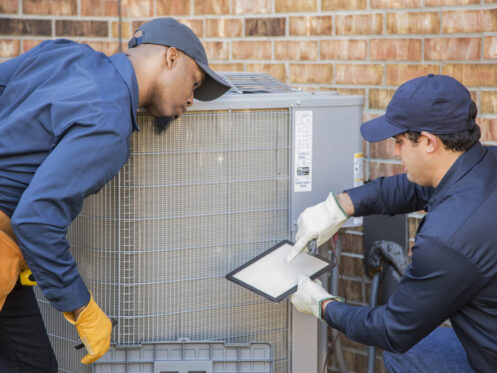Heat pumps have the remarkable ability to provide year-round temperature control. With built-in reversing valves, these units can establish and maintain your preferred temperature without missing a beat. In the right conditions, they’re also the most efficient heating and cooling solutions that homeowners can invest in. However, heat pumps aren’t immune to problems. If the heat pump in your Northridge, CA home is only blowing out cold air, the following are six possible reasons why.
1. It’s Time to Replace Your HVAC Air Filter
The first stop for all HVAC problems is the air filter. Aside from closed air registers and vents, this unit has the most significant impact on airflow throughout your entire HVAC system. All of the incoming air that your heat pump heats or cools must pass through it. When it’s heavy with dirt and other collected debris, airflow suffers and heat pump performance declines.
Another common indication of a dirty air filter is a sudden increase in indoor humidity. If your living space feels both cool and clammy at once, make sure that your filter is clean and properly oriented. To avoid filter-related problems going forward, inspect this component monthly and change it every 30 to 90 days.
2. Your Heat Pump Has Entered Defrost Mode
While unlikely in the relatively warm winters of Northridge, a heat pump’s condenser coil can frost over when outdoor temperatures plummet. When heat pumps detect frosting on their coils, they automatically enter defrost mode. In this mode, heat is absorbed by the indoor evaporator coil and routed outside to correct the problem. This leads to cooler indoor air until the defrost cycle ends. While local temperatures rarely dip below 45 degrees Fahrenheit, if an abnormal cold snap ever rolls in and your heat pump stops producing heat, this could be why. Fortunately, in climates like Northridge’s, the problem is limited and self-correcting.
3. There’s a Refrigerant Leak
Refrigerant is the lifeblood that drives a heat pump’s heating and cooling operations. If your heat pump develops a refrigerant leak, it will increasingly struggle to produce cool air in summer and warm air in winter. This could be the cause of your issue if the air coming out of your vents is lukewarm rather than frosty.
Check your heat pump’s evaporator coil for small, light-brown beads of liquid. Sometimes referred to as “champagne bubbles” they’re a sure indication of leaking refrigerant. Given that heat pump compressors operate under tremendous pressure, using your heat pump with a refrigerant leak for too long could cause compressor failure.
4. Your Thermostat Is Set Incorrectly
Heat pump reversing valves toggle from heating to cooling as needed. When winter rolls in, if you’re only getting cool air from your vents, it may be that your thermostat is set incorrectly. For instance, it should be set to “HEAT” rather than “COOL.” Be sure to check your thermostat’s fan setting as well. When HVAC fans are set to “ON”, they run nonstop and HVAC systems simply circulate indoor air without conditioning it. Setting the fan to “AUTO” will initiate heating mode and ensure that the fan only runs during heating cycles for warm air distribution.
5. You Aren’t Used to the Radically Different Performance of a Heat Pump
Heat pumps are fast becoming the industry standard for residential heating in many California areas. If you’re used to the ultra-rapid heating and higher temperatures of a gas-fired furnace, it may take a while to adjust to a recent heat pump installation. While gas-combustion furnaces produce heat with temperatures as high as 140 degrees Fahrenheit, the temperature of heat from heat pumps tops out at just 90 degrees. Given that this is colder than your body’s temperature, the air coming out of your vents might feel cold on contact even if it’s warmer than your home’s ambient temperature.
6. Your Heat Pump’s Reversing Valve Isn’t Working
If your heat pump’s reversing valve isn’t working, it may be unable to move from cooling to heating mode. In addition to poor heating performance, common signs of reversing valve problems include loud buzzing sounds coming from the outdoor condenser unit, sudden and significant increases in home energy bills, and jarring, banging, or rattling sounds coming from air vents that are much like those made by imbalanced washing machines. Only an experienced HVAC technician should handle reversing valve repairs.
Proudly serving Northridge, CA and the surrounding cities since 1961, we offer first-rate air conditioner, furnace, and heat pump service. We also provide ductless mini-split systems, whole-house fans, and cutting-edge indoor air quality improvements. If your heat pump is blowing out cold air, get in touch with Kahn Air today.
